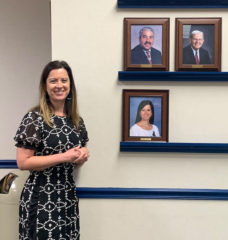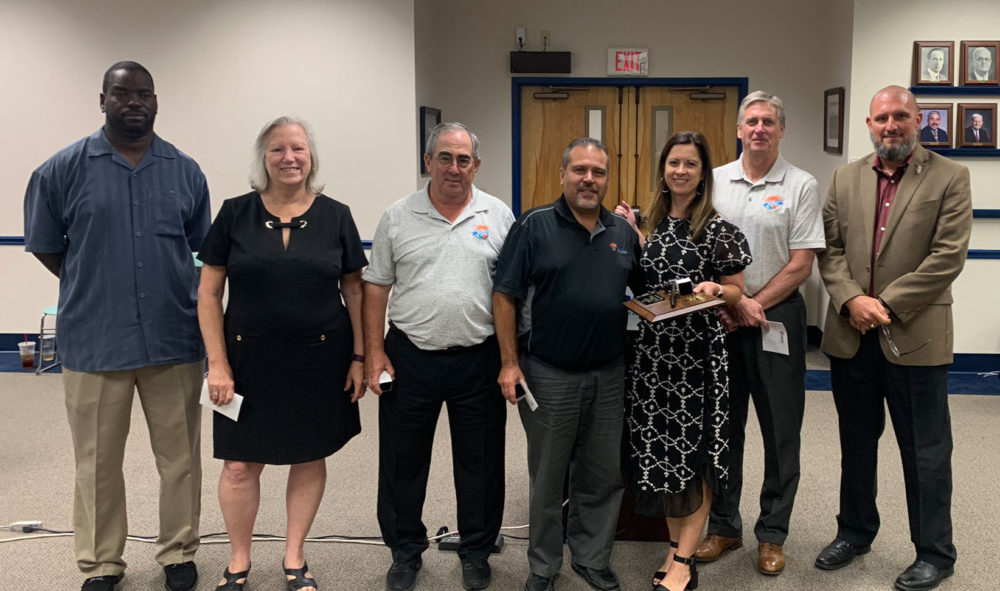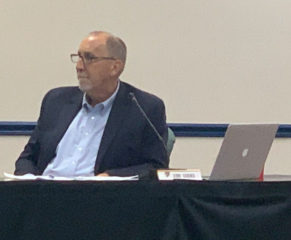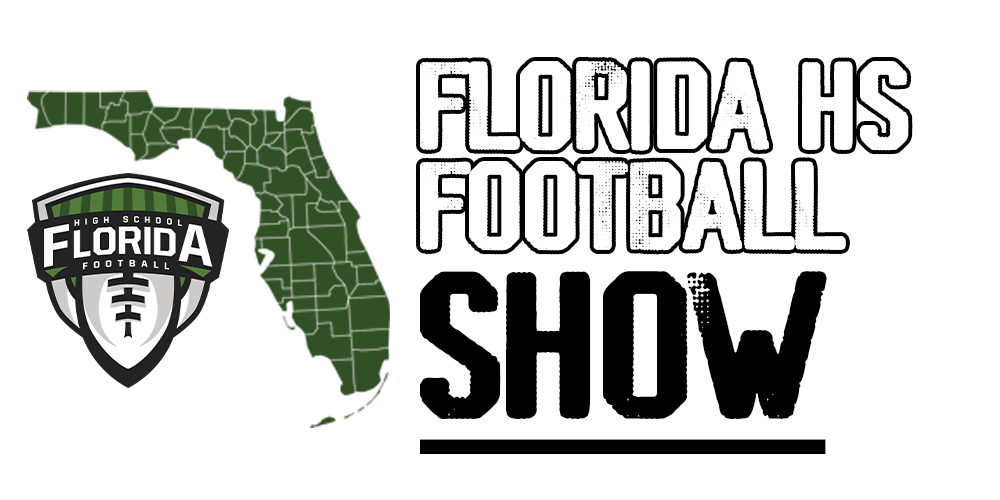GAINESVILLE, Fla. – The Florida High School Athletic Association concluded the very hectic and wild 2020-2021 school year that saw a record number of board meetings with the Annual Business meeting taking place at the Robert W. Hughes FHSAA Building.
One of the biggest – and controversial – topics on the agenda was possibly not allowing middle school athletes at combination schools that offer both middle school and high school students on the same campus to compete in varsity level sports starting in 2023 as proposed by board member Jeff McLean, athletic director of Merritt Island.
But the agenda item never made it to a vote.
Instead, as the committees started going through their reports, the Governance Committee was the first to announce they had voted not to recommend the action item be approved. This came on the heels of Executive Director George Tomyn not providing a recommendation given the fact that proper vetting protocols had not been committed at that time.
The ultimate kicker came when board member Carlos Ochoa, Athletic Director of Hialeah Gardens told the board that the Operations Committee voted to table the item thus removing it as an action item but allowed McLean to speak on his intent behind the action item.
McLean told the board that he was looking at specific policies that state the state series for varsity level teams with high school grade levels of 9-12 only. However, bylaws also allow those in middle school grades in combination schools to participate at the varsity level to field complete teams.
“The whole thing was just to get a discussion and awareness of why we have these rules, you know where classification and everything is based on enrollment in nine through 12, but yet we allow seventh and eighth graders [to play varsity sports at combination schools],” McLean said.
He added that there are a lot of states that do not even allow middle schoolers to play varsity sports.
“There are a lot of other states that don’t even allow sixth, seventh, and eighth graders [to play varsity sports]. So, it was to bring an awareness of why we allow this group, but not the other group.”
In a 2018 article published by Henderson, Ky., based The Gleaner cited states as Louisiana, Minnesota, and Nebraska allowing middle school students to play varsity-level high school sports if the middle school and the high school are under the same administrator. That is the same situation in Florida with the FHSAA.
FHSAA Bylaw 3.2.2.3 states a “combination school” is any traditional public school, charter school, virtual school, private school, or university laboratory school that provides instruction to students in both middle/junior high school grades and/or senior high school grades (i.e. K-12, K-8, 6-12, 7-12, etc.) under the direction of a single principal as defined in Bylaw 1.4.25 and located on the same campus.
FHSAA makes only one exception and that is for a ninth-grade center at a separate location with participation and enrollment based on a single campus site.
And Bylaw 2.10 clearly defines the Florida High School State Championship Series defining the privilege to “those senior high school and combination schools that are duly elected to full membership in this Association.”
McLean stood firm on wanting to get a discussion and awareness after bringing it up at the April Board of Directors meeting where he said no one knew why these bylaws were in place.
However, McLean said there is nothing personal against any specific public school or private school. He just wanted to bring the question to the forefront but also recognized that the idea is controversial.
He is willing to have the plan go through the Athletic Directors Advisory Committee and possibly to all the sports committees to weigh the pros and cons of middle schoolers playing varsity level sports.
“What is the solution? Do you allow all seventh and eighth-graders in the state to play? That is going to be hard to control. Do you want to play seventh and eighth graders and count them on your enrollment, so now it put you where you are drawing from the same number of kids? That is what I heard from some people, saying wait a minute I am nine through 12, your seven through 12, you are not drawing from the same number of students I do,” McLean said.
At the end of the day, McLean seemed to understand where changing the bylaws and policies could impact the most at the varsity level.
“I understand this is not your major sports – if you want to use that term – football, basketball – things like that, you don’t get many seventh and eighth graders, but on your smaller sports such as track, cross country, swimming, golf, and tennis – the individual sports – it does make a difference,” McLean said.
FLAG FOOTBALL MINIMUM GAME REQUIREMENTS INCREASED
The Board of Directors unanimously approved increasing the minimum number of games played requirements for Flag Football from four games to six games to be qualified for the FHSAA state series.
FHSAA Associate Executive Directors of Athletic Services, Justin Harrison stated that when the board approved a couple of years ago of increasing the number of maximum games Flag Football could play in a season from 12 games to 15 games, the minimum numbers did not increase. The vote fixes that and gets it to the 40% of the maximum games that could be played.
The increases in the minimum were also supported by the Flag Football Advisory Committee which met last month after the conclusion of the 2020-21 season.
OUTGOING BOARD PRESIDENT & DEPARTING BOARD MEMBERS

Before officially handing over the reins to Citrus County School Board member Douglas Dodd for the upcoming 2021-22 school year, Otero reflected on how holding the position got personal for her when her 95-year old grandfather passed away in the last couple of months and explained how was the first police chief in the City of Tampa to hire the first two female deputies in the agency’s history, something she reflected on as she placed her portrait on the Wall of Board Presidents at the end of the meeting.
Otero will serve one more year on the Board of Directors before her term expires in June 2022.
Outgoing board members included Wewahitchka Athletic Director and Head Football Coach Bobby Johns who represented Section 1 Public Schools; Ben Hanks of Miami who represented as a Citizen At-Large for Sections 3-4 Citizens; Dr. Randy McDaniel of The Villages Charter Schools who represented as a Citizen At-Large for Sections 1-2 Citizens; Hialeah Gardens Athletic Director, Carlos Ochoa who represented Section 4 Public Schools; Miami Riviera Prep Co-Athletic Director, Mark Schusterman who represented Section 4 Private Schools; and Monteverde Academy’s Director of Financial Aid & Eligibility Compliance Coordinator, Sue Tortora who represented Section 2 Private Schools.

GERDES ELECTED PRESIDENT-ELECT

OTHER ITEMS OF NOTE
- Board of Directors approved unanimously budgets and tentative budgets for the FHSAA and the FHSAA Land Corporations Inc. FHSAA Associate Executive Director of Financial Services, Brandi Waters, explained how things are increasing in the fund balance as the FHSAA continues to recover from the pandemic losses and what happen with spring sports from a year ago when things were canceled.
- Unanimously approved recommendations regarding membership for the 2021-22 school year with continuing membership and accepting new members either for application, provisional, or election to full membership while denying other schools based on various reasons. Four new public schools were added to the rolls with Davenport, Winter Garden Horizon, Lake Buena Vista, and St. Augustine Tocoi Creek joining automatically as full members per the exemptions made in Bylaws 3.4.1.1.4 and 3.4.1.2.4.
- Bobby Johns brought an item that was tabled to have the rural Class 1A go to a hard cap number of the 32 smallest rural schools, which explained was the original intent of the rural classification when it was formed, but the enrollment number was increased to 600 to get the 32 number at that time almost a decade ago. However, he feels some schools have taken advantage of the cap of 600 or under in enrollment. The item had not been vetted by the Athletic Director Advisory Committee or other FHSAA committees.
- Beach Volleyball was approved to get a state series starting next school year while Girls Wrestling and the formation of state series for the Individual Bracket Tournament was tabled as concerns of Title IX were raised. The item regarding Girls Wrestling will be brought back later this year when the FHSAA Board of Directors convenes for the first time for the 2021-22 school year.
- Changes in language to the EL3 form are coming due to the possible signing of HB 241 that was passed during the most recent legislative session of the Florida legislature regarding medical care. New forms will have to be given out or possible addendums and the FHSAA is working to have those changes implemented by the end of this week. The board of those changes unanimously on anticipation of HB 241 becoming law once Governor Ron DeSantis places his signature on the bill.











![FHSAA Board of Directors meeting on Tue. June 8, 2021 at the Robert W. Hughes FHSAA Building in Gainesville, Fla. [Joshua Wilson/FloridaHSFootball.com]](https://floridahsfootball.com/wp-content/uploads/2021/06/FHSAA-June-Board-of-Directors-Meeting-Recap-Featured.jpg)
![Celebration has jumped to the top spot in the Central Florida Rankings according to the Florida Power Rankings Index. [Kyle Zedaker/Tampa Bay Buccanners]](https://floridahsfootball.com/wp-content/uploads/2026/03/FPRI-Central-Florida-Rankings-and-Analysis-Week-3-120x86.jpg)
![Ponte Vedra's Izzy Murray has helped lead her team off to a hot 2-0 start and to a No. 3 ranking this week in the Northeast Florida Top 15 rankings from the Florida Power Rankings Index [Joshua Wilson/FloridaHSFootball.com]](https://floridahsfootball.com/wp-content/uploads/2026/03/FPRI-Northeast-Florida-Rankings-and-Analysis-Week-3-120x86.jpg)
![Belleview is ranked No. 3 and has played the region's toughest schedule so far this season after two weeks in. [Belleview Flag Football]](https://floridahsfootball.com/wp-content/uploads/2026/03/FPRI-North-Central-Florida-Rankings-and-Analysis-Week-3-120x86.jpg)
![Choctawhatchee (Fort Walton Beach) continues to remain the top-ranked team in the FPRI Panhandle Region rankings going into Week 3 [Joshua Wilson/FloridaHSFootball.com]](https://floridahsfootball.com/wp-content/uploads/2026/03/FPRI-Panhandle-Rankings-and-Analysis-Week-3-120x86.jpg)
![Harmony started getting their season underway in Week 2 and is a heavy favorite in their games [Doug DeFelice/Tampa Bay Buccaneers]](https://floridahsfootball.com/wp-content/uploads/2026/02/FPRI-Forecast-2-24-through-2-28-2026-120x86.jpg)
![No. 15 St. Thomas Aquinas (Fort Lauderdale) bounced back from their season opening loss last week on Monday against West Broward (Pembroke Pines). [St. Thomas Aquinas Athletics/Instagram]](https://floridahsfootball.com/wp-content/uploads/2026/02/Daily-Scoreboard-Recap-Report-for-2-23-2026-120x86.jpg)